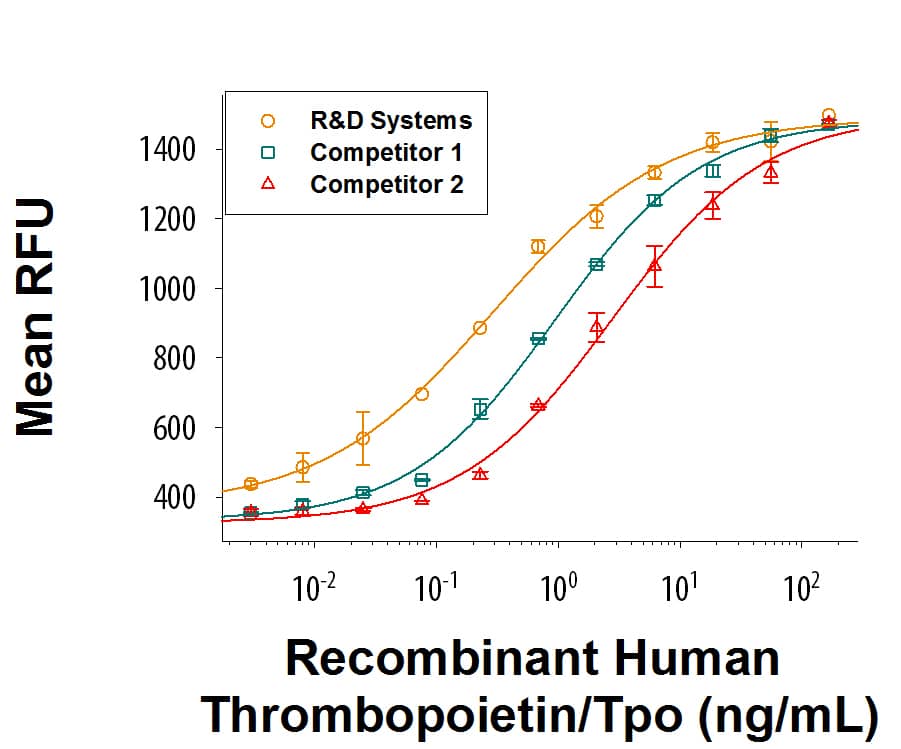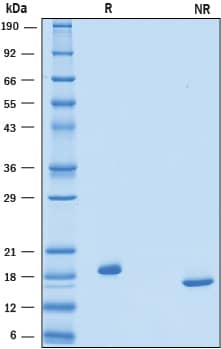Recombinant Human Thrombopoietin (E. coli-expressed), CF
R&D Systems, part of Bio-Techne | Catalog # 288-TPE


NEW VERSION AVAILABLE! Combing R&D Systems quality with scalability, try our new version of Human Recombinant Thrombopoietin/TPO (Catalog # BT-TPO).
Key Product Details
Product Specifications
Source
E. coli-derived human Thrombopoietin/Tpo protein
Ser22-Leu195
Ser22-Leu195
Purity
>95%, by SDS-PAGE visualized with Silver Staining and quantitative densitometry by Coomassie® Blue Staining.
Endotoxin Level
<0.10 EU per 1 μg of the protein by the LAL method.
N-terminal Sequence Analysis
Ala-Ser22
Predicted Molecular Mass
18.7 kDa
SDS-PAGE
19 kDa, reducing conditions
Activity
Measured in a cell proliferation assay using MO7e human megakaryocytic leukemic cells. Avanzi, G. et al. (1988) Br. J. Haematol. 69:359.
The ED50 for this effect is 0.05-0.5 ng/mL.
The ED50 for this effect is 0.05-0.5 ng/mL.
Scientific Data Images for Recombinant Human Thrombopoietin (E. coli-expressed), CF
Recombinant Human Thrombopoietin (E. coli-expressed) Bioactivity
Recombinant Human Thrombopoietin/Tpo (Catalog # 288-TPE) stimulates proliferation in the MO7e human megakaryocytic leukemic cell line. The ED50 for this effect is 0.05-0.5 ng/mL, which is more than 2-fold more active than two competitors'.Recombinant Human Thrombopoietin (E. coli-expressed) SDS-PAGE
2 μg/lane of Recombinant Human Thrombopoietin/Tpo was resolved with SDS-PAGE under reducing (R) and non-reducing (NR) conditions and visualized by Coomassie® Blue staining, showing bands at 19 kDa and 18 kDa, respectively.Formulation, Preparation and Storage
288-TPE
| Formulation | Lyophilized from a 0.2 μm filtered solution in Sodium Acetate. |
| Reconstitution | Reconstitute at 100 μg/mL in sterile, deionized water. |
| Shipping | The product is shipped with polar packs. Upon receipt, store it immediately at the temperature recommended below. |
| Stability & Storage | Use a manual defrost freezer and avoid repeated freeze-thaw cycles.
|
Background: Thrombopoietin/Tpo
References
- Deutsch, V.R. and A. Tomer (2006) Br. J. Haematol. 134:453.
- Kaushansky, K. (2005) J. Clin. Invest. 115:3339.
- Li, J. et al. (1999) Br. J. Haematol. 106:345.
- Bartley, T.D. et al. (1994) Cell 77:1117.
- de Sauvage, F.J. et al. (1994) Nature 369:533.
- Marcucci, R. and M. Romano (2008) Biochim. Biophys. Acta 1782:427.
- Kaushansky, K. et al. (1994) Nature 369:568.
- Kaushansky, K. et al. (1995) Proc. Natl. Acad. Sci. 92:3234.
- Broudy, V.C. et al. (1995) Blood 85:1719.
- Lok, S.I. et al. (1994) Nature 369:565.
- Chen, J. et al. (1995) Blood 86:4054.
- Oda, A. et al. (1996) Blood 87:4664.
- Van Os, E. et al. (2003) Br. J. Haematol. 121:482.
- Kato, T. et al. (1997) Proc. Natl. Acad. Sci. 94:4669.
- Foster, D. & Hunt, P. (1997) Thrombopoiesis and Thrombopoietins 13:203.
- Ehrenreich, H. et al. (2005) Proc. Natl. Acad. Sci. 102:862.
- Samoylenko, A. et al. (2008) Cell. Signal. 20:154.
Alternate Names
MGDF, MK-CSF, MKCSF, MPLLG, THCYT1, THPO, Tpo
Gene Symbol
THPO
UniProt
Additional Thrombopoietin/Tpo Products
Product Documents for Recombinant Human Thrombopoietin (E. coli-expressed), CF
Product Specific Notices for Recombinant Human Thrombopoietin (E. coli-expressed), CF
For research use only
